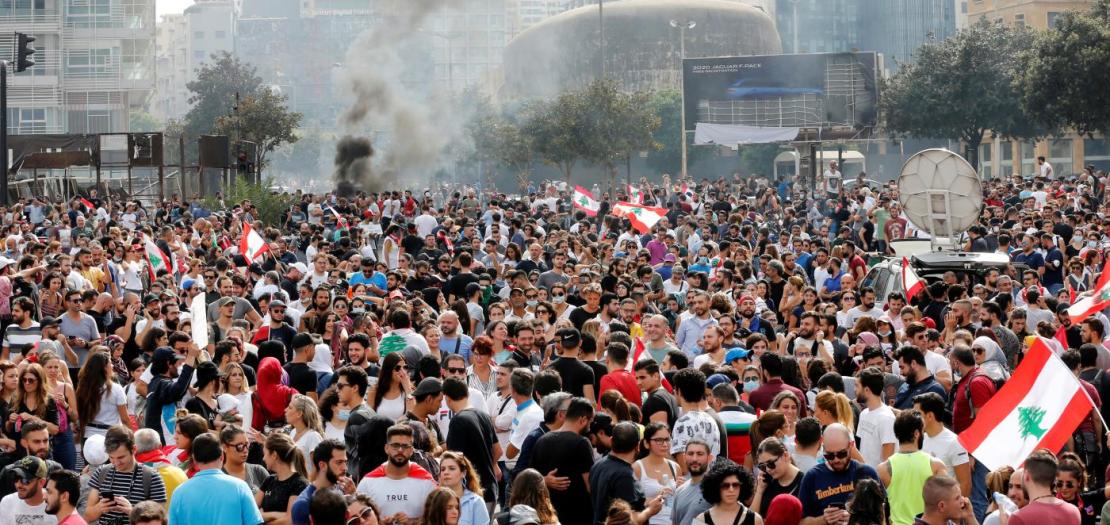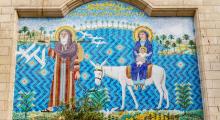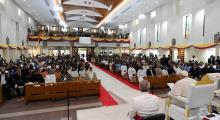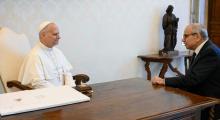Issued by the Catholic Center for Studies and Media - Jordan. Editor-in-chief Fr. Rif'at Bader - موقع أبونا abouna.org

Following is text of the address delivered by Professor Michel Abs, secretary general of the Middle East Council of Churches, in light of the critical events taking place in Lebanon and the region, during an interview on Radio Van.
First, we must make it clear that displacement based on violence is a violation of laws and the Bill of Human Rights. It is, in fact, a process of humiliation, a daily violation, and a massive crushing of human dignity. It involves removing individuals from the circle of their daily lives, from their schools and institutions, and throwing them into the streets, which constitutes the height of humiliation and societal disintegration. People live together in a community that provides safety, stability, and tranquility. Casting them into the unknown prevents them from realizing what their future holds.
Historically, we experienced such events in the eighties, and today they are being repeated through displacement, relief, refuge, and similar situations. The main issue we neglected in the past, but must pay attention to today in this dilemma of displacement, is the dismantling of the psychological strength of individuals by throwing them into the unknown, halting production, and destroying their livelihoods, leaving them prey to poverty, unemployment, and destitution. We are placing a large segment of the population into a crucible of economic and social destruction resulting from displacement, war, and aggression.
There are people who do not want us to be alive or to exist in the first place. They aim to exterminate us and use various methods to do so. This is what is happening in Lebanon and the Levant, or what we call the Antiochian Levant.
Moreover, the Middle East Council of Churches was the first to describe the Gaza war on the eighteenth of October 2023 as "genocide" because it is a war of extermination and ethnic cleansing. Despite objections from some to this description, they gradually agreed to the term and adopted it.
In this context, I would like to draw attention to the fact that I participated in a meeting of the World Council of Churches in Athens on the subject of the "apartheid wall in Palestine," which is a prelude to what is happening in Lebanon. The Gaza model is gradually being repeated in Lebanon, and this is what we fear. Talk of ceasefires, negotiations, and diplomatic attempts to this day is a waste of time, and this is what makes the enemy more audacious. We therefore hope that we will not have a prolonged path in this direction.
Yes, what is happening is genocide, with a daily death toll of 500 people. The total number of those killed exceeds the numbers typically recorded in war statistics. Worse, it is being waged against a major part of the Lebanese in an attempt to pit them against another part, and that's what we fear.
At the relief level, the Diakonia and Social Service Department of the MECC sent an appeal for help and support, dealing with relief affairs in all its dimensions, even psychological. We held an expanded general secretariat meeting and the working group, during which we confirmed that what is happening in Lebanon has gone beyond the problem of relief, development, and rehabilitation to become a general national problem. The meeting included dimensions of media, theology, politics, and culture, and we considered that relief work falls under the competence of the expanded General Secretariat.
It is worth mentioning that the Diakonia Department had started a year ago to send assistance to the south to shelter centers for the displaced. Here, it must be clarified that the Council is not like other relief institutions, as it cannot provide shelters with rapid assistance. The Council secures the needs of relief work from the local market. We launched the appeal as we are looking forward to the post-relief phase—rehabilitation work and the beginning of development—that is, we care about the needs of people in the post-relief phase, especially vocational rehabilitation and housing.
At the same time, we see clearly that the world has turned into a "mute devil", silent about the truth, knowing the truth yet remaining silent, and the killing and displacement that our country and many countries have witnessed is the best proof of that.
Yes, humanity has double standards, and the interests of arms manufacturers, oil companies, and other multinational corporations are linked within a global system that makes decisions which consequences we see in death, destruction, and violations of the most basic humanitarian norms.
It is not politicians who make decisions; rather, those who aim to get their hands on the world's wealth and raw materials exploit them for their own interests. They follow their own agendas, according to which states are run in this world, where the poor and destitute are recruited, armies are sent and exploited to control the interests of peoples and increase wealth. More seriously are the environmental problems resulting from wars and the use of fossil fuels, which are a burden on human life in modern society. What is this "coincidence" that the organizers of these global environmental conferences are the same ones who extract fossil fuels?
At the Lebanese national level, we have found hope in the scenes of cohesion, support, and national human solidarity among the Lebanese people. But this remains dependent on the duration of the war and the crisis resulting from it, as loving and spontaneous solidarity may not continue if the crisis is prolonged.
In addition, we must make it clear that the initiatives we are witnessing today are not enough, neither in Lebanon nor in the world as a whole. What various bodies are doing is like a "stake that supports the fragile structure," and this is a delicate equilibrium. Everything these organizations do is not enough in the face of the capabilities of a bankrupt state, as opposed to a capable state of the aggressors.
Despite all this, we believe that action on the ground is necessary, and the word, in its moral dimension, has a positive impact. When we issue ecclesiastical statements and utilize top international communication platforms, it acts as advocacy and a humanitarian, social, and political appeal. Alongside this, a range of communications forms means of pressure on certain decisions. But the Council only intervenes in development decisions.
In conclusion, I would like to say: Our time is one of hypocrisy and double standards based on two basic things: systematic brainwashing at the global level and some naivety among certain groups as a result of developed countries' views of these poor developing peoples.
In the face of all this, I stress that "the Lebanese should not slide into strife, for in doing so they may serve those who carried out the war against them."







